Charles Louis Loos
1823-1912
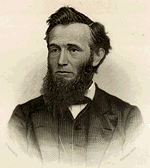
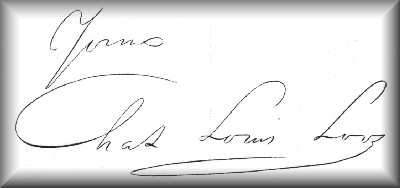
CHARLES LOUIS LOOS
by Wayne Kilpatrick
Charles Louis Loos was born at Woerth-sur-Sauer, Department of the Lower Rhine, (Alsace) France, on December 22, 1823. (W. T. Moore, The Living Pulpit of the Christian Church (Cincinnati, Ohio: R. W. Carroll, Pub. 1867), 445.) His father was Jacques G. Loos and was French by birth. His mother, Katherine Kull, was born in Bavaria and was of German blood. (W. T. Moore, “Charles Louis Loos Heeds Last Call of His Life’s Master,” Lexington Leader (Feb. 27, 1912): 1-2.) Even though Charles Louis was born during the reign of Louis XVIII, he was named, not after royalty, but rather after his grandfather Charles Louis, a French magistrate. The Loos family were great French Republicans and Napoleonists. A prized family document was Jacques Loos’ commission into the French army under Napoleon.
Though being a great French Republican, Jacques migrated to the United States in 1832 and settled in New Franklin, a small village in Starke County, Ohio, near Canton. His wife and five children followed in November of the next year only to find Jacques deathly ill. He died three weeks later. The mother and children were fortunate in finding German and French speaking neighbors on the Ohio frontier, who helped make them feel at home.
Young Charles Louis Loos had become an American at heart before leaving France. When the Marquis de Lafayette died, in a dirge sung for him, he was called the strongest friend of Washington. Young Charles Louis asked, “Who is Washington?” (Ibid.) Then his family bought a fine silver silhouette of Washington and the boy gazing at it for hours became enamored with America and Washington. He became a devout patriot of America; years later, when visiting abroad, he presented himself as a true American.
Young Charles Louis had had superior school advantages in France; with true patriotic instinct, he formed a fervent affection for America and entered, energetically, upon the study of English. His training in the French and German languages, in the old country, gave him much help in learning the new language. At sixteen he began teaching in the public schools. (W. T. Moore, “A Noble Ministry,” Christian Standard XLV (July 17, 1909), 29:1243.) This was the beginning of his life’s vocation. He was destined to be one of the great teachers in the Master’s cause.
His concern for God’s kingdom grew out of his religious background. His people were Lutherans. His grandmother was a very pious Lutheran and her example was etched deep into young Charles Louis’ memory. In 1837 he was confirmed in the Lutheran communion in Starke County, Ohio. W. T. Moore states: “He has never ceased to recognize the blessed influence of his early religious training, and thinks he is largely indebted to it for becoming a preacher of the Gospel.” (Moore, Ibid.) A few months after being confirmed in the Lutheran Church, his Lutheran conviction began to fade. He had been introduced to the principles of the “Restoration Movement.” He began discussing religious matters with some disciples in the church at Minerva, just five miles from his home. He began investigating their teachings and found them to harmonize with the Bible, more closely than his Lutheran teachings. On October 14, 1838, (W. T. Moore, “The Loos Group of Preachers,” Christian Standard LII (May 27, 1916) 22:1241.) he attended a meeting conducted by J. Wesley Lanpheare. He was immersed that evening by Whittacre. (Moore, Ibid.) This caused strife with his Lutheran family and friends; but he never once wavered in his new found faith. By his seventeenth year he was preaching the gospel in his vicinity. Many felt that he had great promise in the ministry.
In September 1842 he was enrolled in Bethany College where he began classes under Alexander Campbell. Campbell put young Loos in classes in grammar and saying nothing about having taught it for a number of years, he modestly started in the class, but was soon promoted. Upon graduation in 1846 Campbell was so impressed by Loos’ high rank as a scholar and thinker that he immediately appointed him professor in the primary department, a position he held for three years. (R. H. Crossfield, “Charles Louis Loos as a College Man,” Christian Standard XLVIII (March 16, 1912) 11:3.) Campbell was proud to day, and often did, that “no better mind, no apter scholar, had ever come under observation and tuition.” (Ibid.) Just one year after graduation he would be privileged to meet a new student who would become a lifelong friend – John W. McGarvey. (DeLois Stevenson, ed., The Autobiography of J. W. McGarvey. A Transcript of McGarvey’s Notes for Memoirs (Lexington, Kentucky: College of the Bible, 1960), 84.) While teaching at Bethany, he was married to Rosetta Erina Kerr, a beautiful and witty Irish girl, the daughter of John Kerr, who was a Presbyterian minister of Newry, Ireland.” (Moore, Ibid.) The wedding took place at Bethany on July 6, 1848, and Alexander Campbell officiated. While working with Bethany college, Campbell made Loos his private secretary. (Frederick D. Kirshner, “Comets and Constellations–Charles Louis Loos,” Christian Standard LXXVII (Feb. 21, 1942) 8:177.) This also explains why Loos’ name appears on Campbell’s will. Loos learned much from his chief and gained some valuable insights into what made a school such as Bethany work.
While employed at Bethany he was ordained to the ministry by Alexander Campbell and Robert Richardson in 1849. (W. T. Moore, “A Noble Ministry,” Christian Standard XLV (July 17, 1909) 29:1243.) He began serving the church in Wellsburg, Virginia (now West Virginia), the same year. In 1850 he moved to Somerset, Pennsylvania, and labored until 1856. From 1853 to 1856 he was headmaster for a Collegiate Institute, which he had organized at Somerset. During his stay in Pennsylvania he also founded and edited The Disciple (1851-1853). (A Published Article Signed G. C. K., updated, in Charles Louis Loos’ biographical file in the library of Lexington Theological Seminary, Lexington, Kentucky.) After Somerset, Pennsylvania, he moved to Cincinnati, Ohio, and became assistant editor of The Christian Age. He now was having to choose between church and school labors, he preferred the latter, and from 1857 his occupation was devoted almost entirely to school work. He became president of Eureka College, Illinois, that same year. The next year, 1858, he accepted a call back to Bethany College to the professorship of ancient languages. He remained there for twenty-two years. In 1880 he was called to Lexington, Kentucky, to be president of Kentucky University, a position he held for seventeen years. He retired from the presidency in 1897, but retained professorship of Greek.
While best known as an educator and minister, he was eminently useful in other avenues of human endeavor. He for some years was a prolific writer although he wrote no books. His pen was wielded as a mighty sword in brotherhood journals including The Millennial Harbinger and even secular journals like The Lexington Leader and the Wheeling Intelligencer. He did write the history, in booklet form, of the first national convention of the Missionary Society in Cincinnati in 1849. (Kirshner, 178.)
Loos held an interest in the Missionary Society as a tool for evangelism. He attended the 1849 Cincinnati convention. He was a close associate and friend of Isaac Errett in forwarding the work of the Foreign Christian Missionary Society. Loos served as its president from 1889 until 1900. (Frederick D. Kirshner, “Foreign Christian Missionary Society,” Christian Standard XXXIX (June 27, 1903) 26:915.) He did, however, oppose a general representative organization to have charge of all benevolent, educational, and missionary interest. (Charles Louis Loos, “Editorial” Christian Standard XXI (Oct. 8, 1887) 40:1578.) He fully believed that the society could effectively do the work of evangelization and that no Bible principle would be compromised and that the churches would better be served in their efforts to carry the gospel into all the world.
His labor in the churches was not one to be held lightly. He was a minister in the pulpit for many years. He served as an elder in the Central Christian Church in Lexington for many years. He also would fill the vacant pulpit when the local minister was away. Kirshner says that it was hard for Loos to preach “without putting a flavor of Greek into the surroundings.” (Kirshner, 178.)
He was a master Greek teacher at Kentucky University. One of his students felt sure that Loos thought Greek would be spoken in heaven, and he taught is as though it was. His students remembered him for the enthusiasm for the Greek language and his boundless confidence in hopeful youth duly instructed and directed in the right ways. He always manifested this confidence in his students. This earned him the love and respect of the student body and the affectionate title “Daddy Loos.”
Though prominent in the school in Lexington during the days of bitter controversy, he pursued a career free from the disputes and antagonisms. He did, however, voice his opinion upon matters he felt were important. Having watched the rise of foreign rationalism and its spread to our own country, he became a staunch and competent critic of the critics. He wanted to fight for truth.
His love for truth and his firm conviction in defending it cause him to become a fighter for truth, liberty, and justice–and ideal derived from his French Republicanism. He championed the rights of the Black people in church and in politics. He attended the formation meeting of the Abolition Party–the first anti-slavery party in the state of Virginia–in the summer of 1844. Charles Louis Loos, Unpublished, handwritten letter written by Loos upon reading an article in the Intelligencer, November 27, 1879, concerning the formation meeting of the Abolition Party. Letter is in the Charles Louis Loos Scrapbook in the library of Lexington Theological Seminary, Lexington, Kentucky.) His love for liberty was a love that caused him to fight for the rights of all of God’s children. He also encouraged the Southern Christian Institute, a Black school founded in 1874 on a plantation near Edwards, Mississippi. His life was always a blending of the promotion of Christian education and liberty and justice for all.
Like the rest of us, brother Loos did not live a perfect life, but he made valuable contributions to God’s kingdom in helping train so many young men for the ministry. His valiant life came to an end in a peaceful death at 5 o’clock Tuesday morning on February 27, 1912, at his house at 457 West Fourth Street in Lexington, Kentucky.
Although we may not agree with all of his positions on brotherhood issues, all three branches of the Restoration Movement owe brother Loos a debt of gratitude. “Blessed are the dead which die in the Lord . . . and their works do follow them.” (Rev. 14:13).
![]()
Bibliography
A Published Article Signed G. C. K., updated, in Charles Louis Loos’ biographical file in the library of Lexington Theological Seminary, Lexington, Kentucky.
Crossfield, R. H. “Charles Louis Loos As A College Man,” Christian Standard. XLVIII, March 16, 1912.
Kirshner, Frederick D. “Comets and Constellations-Charles Louis Loos,” Christian Standard. LXXVII, Feb. 21, 1942.
. “Foreign Missionary Society,” Christian Standard. XXXIX, June 27, 1903.
Loos, Charles Louis. “Editorial,” Christian Standard. XXI, October 8, 1887.
Moore, W. T. The Living Pulpit of the Christian Church. Cincinnati, OH: R. W. Carroll, Pub., 1867.
. “Charles Louis Loos Heeds Last Call of His Life’s Master,” Lexington Leader. February 27, 1912.
. “A Noble Ministry,” Christian Standard XLV, July 17, 1909.
. “The Loos Group of Preachers,” Christian Standard. XLVIII, March 16, 1012.
Stevenson, DeLois, ed. The Autobiography of J. W. McGarvey. A Transcript of McGarvey’s Notes For Memoirs. Lexington, KY: College of the Bible, 1960.
UNPUBLISHED MATERIAL
Loos, Charles Louis. Unpublished, handwritten letter written by Loos upon reading an article in the Intelligencer, November 27, 1879, concerning the formation meeting of the Abolition Party. Letter is in the Charles Louis Loos Scrapbook in the Lexington Theological Seminary, Lexington, Kentucky.
![]()
(Another) Biographical Sketch Of Charles Louis Loos
by W.T. Moore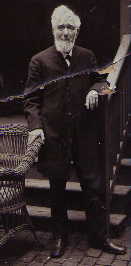
"CHARLES LOUIS LOOS was born, December 22, 1823, at Woerthsurl-Sauer, Department of the Lower Rhine, France. His father's name was JACQUES G. LOOS, and he was also a native of France; his mother was a native of Bavaria, consequently, German.
The early life of CHARLES, in France, was spent, after his fourth year, in attending the academy in his native place, until his departure for the United States, in 1834. His father, who was an enthusiastic Republican, left France for America, in 1832, to find a home for the family. The family followed in the fall of 1834, and, when they reached the United States, found the father sick at New Franklin, Starke County, Ohio, where, in a short time, he died.
While he was in France, CHARLES had been educated in both the French and German languages, and his knowledge of these enabled him soon to become acquainted with the English. His family belonged to the Lutheran Church, and he was trained religiously by a pious grandmother, in whose family he was reared. He has never ceased to recognize the blessed influence of his early religious training, and thinks he is largely indebted to it for becoming a preacher of the Gospel.
In the fall of 1837, he was confirmed in the Lutheran Church; in a few months afterward he became acquainted with the Disciples, of whom there was a Church at Minerva, five miles from his home. He at once began to examine their religious position, and, having become satisfied that it was in accordance with the teaching of the Word of God, in 1838, at a meeting held by J. WESLEY LANPHEARE, he was immersed by JOHN WHITACRE. This caused great bitterness and opposition among his Lutheran relatives; but he had taken the step under an earnest conviction of duty, and did not stop to consult with flesh and blood.
He taught school at sixteen years of age, and, at seventeen, began to preach in the vicinity of his home, and gave great promise of future usefulness.
In September, 1842, he entered Bethany College, where he graduated in 1846, and remained in the college three years, as a teacher in the primary department. He was married at Bethany, July 6, 1848, to ROSETTA E. KERR, daughter of Rev. JOHN KERR, a Presbyterian minister, of Newry, Ireland. She had been in America four years.
In 1849, he was ordained to the work of the ministry, and removed to Wellsburg, Virginia, and preached for the Church at that place one year. In October, 1850, he removed to Somerset, Pennsylvania, where he remained five years, and, while there, in addition to his pastoral labors, edited a monthly periodical, called "The Disciple," for two years, and was principal of an academy for the same length of time. In January, 1856, he took charge of the Church corner of Eighth and Walnut streets, Cincinnati, also assisting in editing the "Christian Age." Having been elected President of Eureka College, Illinois, he moved there in January, 1857, and remained till September, 1858, when he returned to Bethany College, having been elected to the Chair of Ancient Languages and Literature in that institution. He still occupies that position.
Professor Loos is just five feet ten inches high, has dark hair, light hazel eyes, and weighs about one hundred and forty pounds. His personal appearance and manners indicate his French origin, while his speech is decidedly German. The influence of these two races is still more clearly marked in his mental characteristics. The studious thoughtfulness, the philosophical acumen, the plodding industry, and the generous hospitality of the German are happily blended with the volatile spirit, fire, and enthusiasm of the French. He is a deep, earnest thinker, and generally takes a broad, comprehensive view of things. As a public speaker, his style is very original. His gesticulation is rapid, and, when warmed up, his thoughts flow like a torrent. His whole soul seems to be absorbed in his theme, and sometimes, in his happiest moods, he speaks as if he were inspired."
-From The Living Pulpit of the Christian Church, (1868) W. T. Moore, ed. pages 445
![]()
Location Of The Grave Of Charles Louis Loos
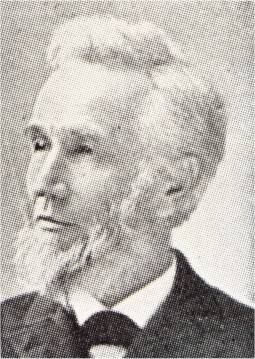
Older Picture
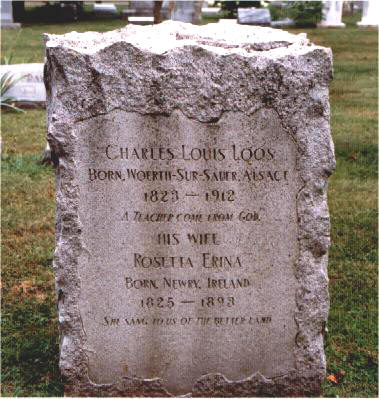
The grave of Charles Louis Loos is located at Lexington Cemetery, Lexington, Ky. Heading west from downtown on West Main Street enter the cemetery to the right. Continue through the iron gates on the main little road (Main Avenue). Go between the little lakes to the new part of the cemetery and turn left as you are passing section by "16."("16" is on the right.) Once you've made the left turn Section "F-1" will be on your right. Grave is located a few markers in. Section F-1, Lot 60, Part W1/2
Note: While parked there don't miss John Samuel Shouse across the street in section "F-1," and Caroline Pierre is close by in little wedge north of "F-1."
![]()
See Where Loos Is Buried At Lexington Cemetery, Lexington Kentucky